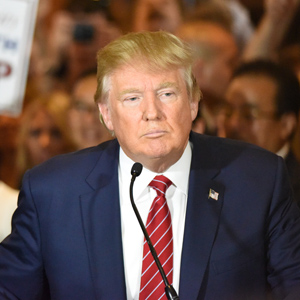Trump signs order banning federal grants to 'sanctuary cities'; are there legal obstacles?

President Donald Trump. Photo by a katz / Shutterstock.com.
The pushback began immediately after President Donald Trump began carrying out his campaign pledge to clamp down on illegal immigration by signing two executive orders on Wednesday. One order called for immediate construction of a wall along the Mexican border, and the other would examine ways to withhold federal grant money to “sanctuary cities” that don’t report immigrants in the country illegally to federal authorities, the Washington Post and CNN report.
Boston Mayor Martin Walsh said the city would “not retreat one inch” on its protections for immigrants, while Chicago Mayor Rahm Emanuel vowed that Chicago would remain a sanctuary city, according to the Boston Globe and CNN. And New York Attorney General Eric Schneiderman asserted that Trump lacks constitutional authority to cut off funding.
CNN takes a look at potential legal obstacles. They include:
• The 1987 Supreme Court case South Dakota v. Dole, which said congressional grant restrictions should promote the general welfare and relate to the federal interest in a particular national project or program. The decision upheld the withholding of federal highway funds to states that did not enforce a national drinking age.
• A 2012 Supreme Court ruling on the Affordable Care Act that found Congress couldn’t withdraw existing Medicaid funds from states that refuse to go along with the law’s Medicaid expansion. An opinion in the case by Chief Justice John G. Roberts said Congress can use its spending power to create incentives to carry out federal policies, but the pressure cannot be turned into compulsion. (That portion of Roberts’ opinion carried the day because of dissenters who would have struck down the law in its entirety.)
• The 1997 Supreme Court case Printz v. United States, in which Justice Antonin Scalia wrote that the federal government can’t compel the states to enact or administer a federal regulatory program. The decision struck down portions of the Brady Act that required state and local officials to conduct background checks on gun purchasers.
In a November article published by Bloomberg View, Harvard law professor Noah Feldman said core federalism principles embodied in those rulings allow municipalities to resist cooperation with immigration enforcement, and bar Trump from withholding funds from cities that do so.
“Behold the revenge of conservative federalism,” he wrote. “Judge-made doctrines developed to protect states’ rights against progressive legislation can also be used to protect cities against Trump’s conservative policies. Ain’t constitutional law grand?”
But appellate litigators David Rivkin and Elizabeth Price Foley expressed a different view in a Los Angeles Times article published in December.
According to Rivkin and Foley, the anti-commandeering doctrine doesn’t protect cities from federal requests for information about arrests of immigrants who are in the country illegally. And tying federal law enforcement aid to cooperation in immigration enforcement furthers the goal of public safety, making the conditions relevant to the federal interest, they say.
See also:
ABAJournal.com: “Trump and GOP seem poised to usher in sweeping changes in immigration policy”



